 Small group discussions are at the heart of a public deliberation. Participants sit at a table together, express their opinions, hear ideas from other participants, and wrestle together with the issue at hand. Table facilitators and note-takers play an essential supporting role to help each group’s conversation effectively inform and contribute to the deliberations of the whole group. Each table facilitator and note-taker therefore has a significant influence on the quality of the deliberation and its outcomes. Yet there is much variation in how these roles are performed. This paper explores causes of and responses to this variation in order to advance the practice of intermediate and expert practitioners and note-takers of deliberative dialogue. There are many guides and tip sheets about how to facilitate and record an effective dialogue but most of this information is focused on discussions that aim to identify and create greater understanding about an issue and its dimensions. We focus here on the roles of table facilitator and note-taker working with participants who are tasked with making decisions together, with intent to influence next steps, particularly in the context of policy making and/ or research. Authors: Mary Pat MacKinnon, Jacquie Dale, Susanna Haas Lyons, and Fiona Cavanagh. About Alberta Climate Dialogue: Alberta Climate Dialogue (ABCD) is a community-university research alliance funded by the Social Sciences and Humanities Research Council of Canada from 2010-2015. Our team is exploring how innovative forms of citizen involvement and deliberation can enhance responses and potentially shift the politics of climate change in Alberta. By convening deliberations with partners and researching the process, we are able to test theories, better understand how to design citizen participation for maximum effect, and help create capacity-building tools for others. We seek to empower citizens to take action within their communities and give them the opportunity to make recommendations to municipal and provincial governments on climate change policy. For more information please visit us at AlbertaClimateDialogue.ca
0 Comments
For more than 30 years communities of all sizes have used the Civic Index to measure their civic capital – the formal and informal relationships, networks and capacities that enable communities to solve problems and thrive.
Building on decades of work in communities, the fourth edition updates the Civic Index with a specific focus on equity and engagement; key components for healthy, thriving communities. Use the Civic Index with gatherings of community members, partner organizations or staff to spark conversation about community strengths and areas in need of improvement. Resource Link: www.nationalcivicleague.org/resources/civicindex/ 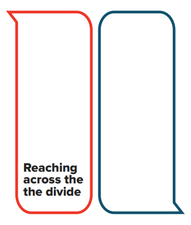 Partisan polarization has reached an all-time high. Almost two-thirds of Americans find it stressful to talk about politics with someone who identifies with another political party. But to solve the most significant problems—and to have a healthy democracy—we must be able to discuss the issues, policies, and values that matter. The purpose of this guide is to help prepare you to speak about what is most important to you in ways that can be heard, and to hear others’ concerns and passions with new empathy and understanding—even and especially if you continue to disagree. Interested in learning more about EP's approach? Consider registering for an Essential Partners workshop or contact us for a free consultation. Download Living Room Conversations published the conversation guide, Guns and Responsibility, in October 2017. The guide gives pointers on how to hold living room conversations in order to develop a deeper understanding between participants around gun beliefs, gun safety, and responsible gun ownership. You can read the guide below, find a downloadable PDF here, or the original on Living Room Conversation’s site here.
From the guide… Overview In Living Room Conversations, a small group of people (e.g. 4-7) people come together to get to know one another in a more meaningful way. Guided by a simple and sociable format, participants practice being open and curious about all perspectives, with a focus on learning from one another, rather than trying to debate the topic at hand. 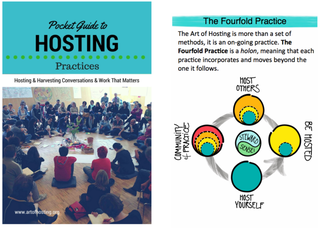 Story Artist Mary Alice Arthur and graphic facilitator Viola Clark collaborated in 2016 to create the first in their Zine series – a POCKET GUIDE TO HOSTING. One side features the Art of Hosting practices, the other side features the AoH methods. Here is a little snapshot of a couple of pages of the zine. (A zine is a self-published work of original or appropriated texts and images, usually reproduced via photocopier.) Art of Hosting will be using the Zine in the upcoming trainings in Innsbruck, Austria and Denmark. Next in the series will be Harvesting. Mary Alice advises: “It is set up as an A4 (if you are not on the A4 system, shrink to fit the space) — follow the instructions for folding (and unleash your inner creative geek!).” Resource Link: AoH Hosting Zine  The Not in Our Town Quick Start Guide: Working together for safe, inclusive communities, was created by Not in Our Town (NIOT) and updated March 2013. The guide gives five steps to begin a campaign in your town or school to stop hate, address bullying, and build safer communities together. Below is an excerpt from the guide, which can be downloaded from NIOT’s site here or at the link at the bottom of the page. From the guide… You may be someone who is concerned about divisions in your neighborhood or school, or you may live in a community that has experienced hate-based threats or violence. Even just one individual or a small group can start a movement to stand up to hate. Not In Our Town is a program for people and communities working together to stop hate, address school bullying and build safe, inclusive environments for all. 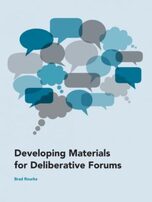 The 36-page guide, Developing Materials for Deliberative Forums, was written by Brad Rourke and published 2014 on the Kettering Foundation site. In the guide, Rourke shares all the elements needed to design an issue guide to better inform participants during deliberation. An issue guide lays out multiple sides of a subject/issue to give participants tools to engage in more informed deliberation, the guide then offers examples of the options, as well as, drawbacks to each one. There is no one perfect way to develop an issue guide; so Rourke provides details on ways to design a guide that is effective at giving participants the information they need to deliberate on the issues at-hand. Below is an excerpt of the article; it can be downloaded in full at the link on the bottom of this page or find it on Kettering Foundation’s site here. From the guide… The 24-page guide, Organizing Study Circles with Young People, was developed by Everyday Democracy [who used to be known as Study Circles Resource Center] and published in 2003. Oftentimes younger people are excluded from participating in engagement efforts, even though youth have much to offer on making decisions and building community. Study Circles are a style of dialogue process, where a small, diverse group of participants can discuss different points of view; usually with the goal of moving from dialogue to action. The guide gives detailed steps for designing a Study Circles process for young people to come together and dialogue. This process encourages youth to be engaged with a variety of perspectives, to hear and be heard, and ultimately to become more active citizens.
Below is an excerpt from the guide and it can be found in full to download on Everyday Democracy’s site here or at the bottom of this page. 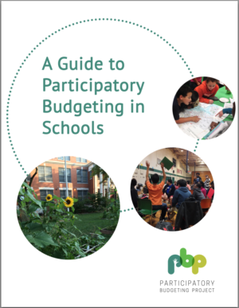 The 57-page guide, A Guide to Participatory Budgeting in Schools, was a project of the Participatory Budgeting Project (PBP) and published in 2016. The guide’s curriculum design was created by Valeria Mogilevich, with project support by Melissa Appleton and Maria Hadden of PBP. This thorough guide gives details for implementing a participatory budgeting process within schools. Participatory budgeting is a process where people decide where to spend a portion of a budget by engaging their community- or in this case- their school, and vote on projects to make final decisions. The guide is rich with process details, helpful hints, plan layouts, and useable worksheets. There are 18 lesson plans and 6 worksheets provided in this guide to get a PB process launched in schools over the course of a semester or school year. Sections include: – Planning – Idea Collection – Proposal Development – Voting – Implementation and Beyond – Worksheets 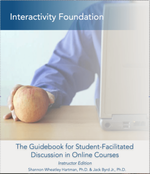 The Guidebooks for Student-Facilitated Discussion in Online Courses, by Shannon Wheatley Hartman, Ph.D. and Jack Byrd Jr., Ph.D. were published January 2016 from Interactivity Foundation (IF). IF offers both a 64-page student guidebook edition and a 60-page instructor guidebook, which describes their discussion process in the 3-parts. Read more about the guidebook and download the PDFs for free on Interactivity Foundation’s website here. From IF… These guidebooks offer a practical guide for students and instructors in online courses. They offer a step-by-step guide to our 3-part online discussion process:
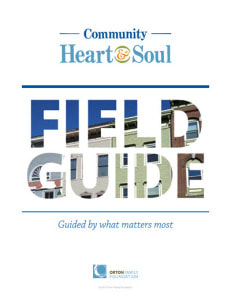 The Community Heart & Soul™ Field Guide (2014) is the Orton Family Foundation’s guide to its tested and proven method of community planning and development. This step-by-step, four-phase method is designed to increase participation in local decision-making and empower residents of small towns and rural communities to shape the future of their communities in a way that upholds the unique character of each place. Community Heart & Soul is based on wide and broad participation from as many residents as possible. Whether the focus is on comprehensive planning, economic development, downtown planning, or an outside-the-box vision and action plan, Community Heart & Soul aims to reach all residents of a town for the best results: results that pay benefits over the long haul. The Community Heart & Soul Field Guide outlines a model Heart & Soul process. Each of the four phases is built around specific goals for learning, capacity building, and engagement. Together they lead to the overall project goals and outcomes. This 62-page step-by-step handbook from the Policy Consensus Institute (now Kitchen Table Democracy) walks readers through the stages of sponsoring, convening, organizing, and participating in a public policy collaborative process. Designed primarily for elected and appointed government officials and civic leaders, the guide also is useful for those who provide leaders with the staff assistance, facilitation services, and support they need to employ these approaches effectively.
The Practical Guide was developed and written by Chris Carlson, founding director of PCI and a leading authority on consensus building in the public sector. The Practical Guide to Collaborative Governance will help equip more leaders – present and future, in the public, private, and civic sectors – with the information and tools they need to bring about better governance through the use of collaborative practices, with instructions on how to: 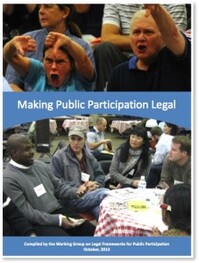 Most of the laws that govern public participation in the U.S. are over thirty years old. They do not match the expectations and capacities of citizens today, they pre-date the Internet, and they do not reflect the lessons learned in the last two decades about how citizens and governments can work together. Increasingly, public administrators and public engagement practitioners are hindered by the fact that it’s unclear if many of the best practices in participation are even allowed by the law. Making Public Participation Legal, a 2013 publication of the National Civic League (with support from the National Coalition for Dialogue & Deliberation), presents a valuable set of tools, including a model ordinance, set of policy options, and resource list, to help communities improve public participation. The tools and articles in Making Public Participation Legal were developed over a year by the Working Group on Legal Frameworks for Public Participation — an impressive team convened and guided by Matt Leighninger, formerly of the Deliberative Democracy Consortium (DDC). NCDD’s October 2010 Resource Guide on Public Engagement showcases the National Coalition for Dialogue & Deliberation’s best collaboratively-created products (like the Core Principles for Public Engagement and the Engagement Streams Framework), as well as recognizing and directing you to a lot of the great work on public engagement that has been done by others in our field.
Created for our 2010 regional events (all attendees received a copy), this must-have guidebook was developed to share stories and resources with the dialogue and deliberation community, public managers, and anyone else with an interest in public engagement. |
Categories
All
|
Follow Us
ABOUT NCDD
NCDD is a community and coalition of individuals and organizations who bring people together to discuss, decide and collaborate on today's toughest issues.
© The National Coalition For Dialogue And Deliberation, Inc. All rights reserved.
© The National Coalition For Dialogue And Deliberation, Inc. All rights reserved.

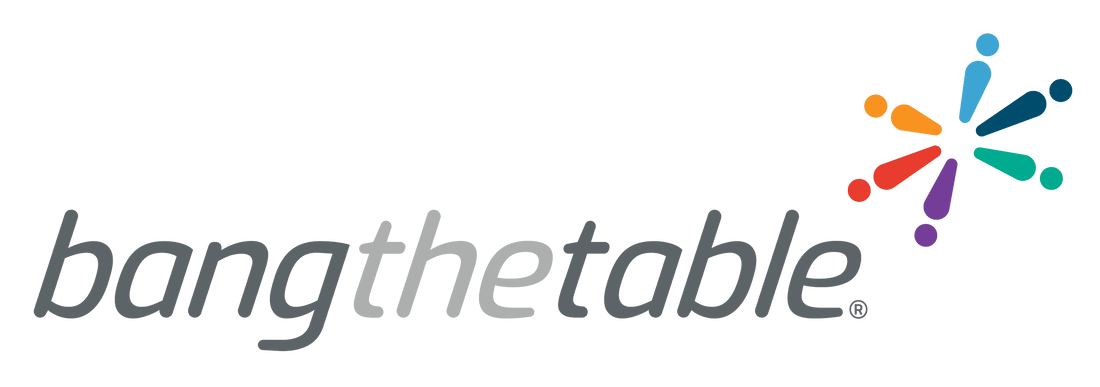
 RSS Feed
RSS Feed